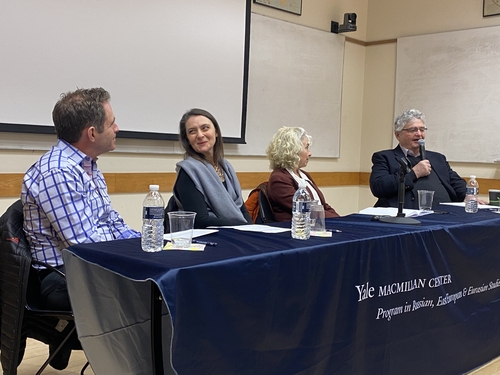
March 5, 2024
On February 7, 2024, the European Studies Council, in collaboration with the REEES Program at Yale, YIVO Institute for Jewish Research, and the Yale Fortunoff Video Archive for Holocaust Testimonies, discussed the third season of the Fortunoff Video Archive for Holocaust Testimonies’ podcast “Those Who Were There: Voices from the Holocaust.” The four speakers of the panel were introduced by Anna Arays, librarian for Slavic & East European Studies: in order of appearance, Eric Marcus (co-producer), Nahanni Rous (lead producer), Eleanor Reissa (host of podcast), and Samuel Kassow (the Charles H. Northam Professor of History at Trinity College).
The event began with the panelists’ general impressions of Vilna as a small and close-knit city. They framed the city as “one of the most important centers of Jewish culture. For hundreds of years.” On the difficult topic of the Holocaust, the panelists reiterated how important it is to talk about it and to not forget it. When it comes to the Jews of Vilna, the speakers elaborated that “the tragedy of the Holocaust is obviously about the loss of millions of individual lives. But it’s also about the loss of an entire civilization.”
The audience remained quiet as the speakers talked about the first-hand accounts of Holocaust survivors they selected and the hundreds of audio recordings and interviews they had to go through in order to create the podcast. The pathos of the talk was accompanied by a historic account of what actually took place in Vilna during World War II. When Poland fell and was divided between Nazi Germany and the Soviet Union, the panelists explained, Vilna “became a center for tens of thousands of refugees who were fleeing from other parts of Poland.”
The panelists introduced audio clips one by one of the testimonies that could be found in the podcast. From humorous to profoundly shocking and eerie, the audio clips captured the vastly different lives and experiences of Vilna residents and the destruction of the Jewish community in Vilna (now Vilnius, Lithuania).
When the panelists visited Vilna in preparation for the podcast, they gathered many testimonies of what is remembered of the massacre to this day. One interview in particular with local Lithuanian girls stood out—it demonstrated just how little of the Jewish memory was preserved in Vilna. That is, in the interview, the local youth shared that they knew what had happened to Lithuanians under the Soviet influence, the generation of their parents, but not to the Vilna Jews of 1941. To this, the panelists responded that “divergent memories are not gonna kiss and make up anytime soon.” Perhaps forever there will be some discrepancy between what different groups in one city remember and what is lost to the past.
With a concluding thought, the panelists said that “it [hearing these testimonies] is challenging, but it is necessary. […] It’s challenging, but worthy and necessary.”
After the panelists exhausted their selection of recordings for this event, they took questions from the audience. The event was held in Luce Hall.
CAI Type:

